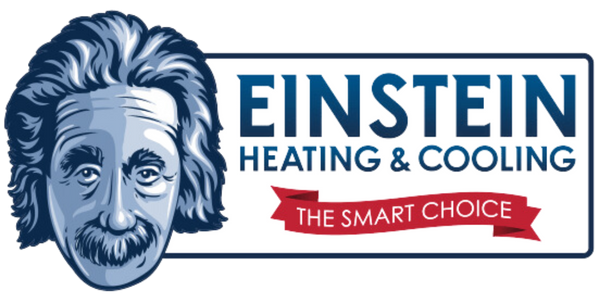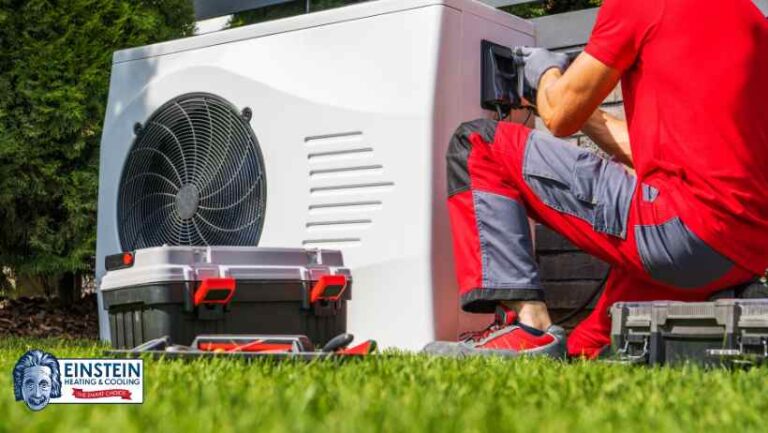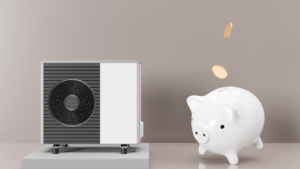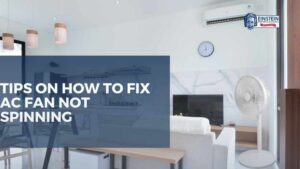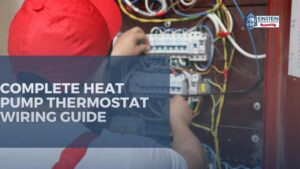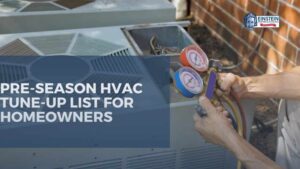Bend, Oregon, known for its beautiful landscapes and diverse climate, relies heavily on heat pump service to maintain comfortable indoor temperatures year-round. Heat pumps provide both heating and cooling, making them an essential component of many homes and businesses. To ensure these systems operate efficiently, regular heat pump service is crucial. In this comprehensive blog post, we check which heat pumps suit your needs, debunk common myths about heat pumps, and list down questions to ask your technicians before installing a heat pump.
What are the types of heat pumps?
A heat pump is a versatile and energy-efficient heating and cooling system designed to regulate indoor temperatures by transferring thermal energy between the inside and outside of a building. Unlike traditional heating and cooling systems that generate heat or cold air through combustion or electricity, a heat pump works by moving heat from one location to another.
Let’s explore and expand upon these various types of heat pumps:
- Air-Source Heat Pumps (ASHP):
- Operation: Air-source heat pumps absorb heat from the outside air and transfer it into a building to provide heating. In the summer, they reverse the process to cool the indoor space.
- Applications: ASHPs are widely used in moderate climates and are cost-effective for both residential and commercial spaces. They are relatively easy to install and have lower upfront costs compared to other heat pump types.
- Ground-Source Heat Pumps (GSHP) or Geothermal Heat Pumps:
- Operation: Ground-source heat pumps utilize the relatively stable temperature of the ground or a water source, such as a well or pond, to extract or release heat for heating or cooling.
- Applications: GSHPs are highly energy-efficient and suitable for various climates. They have a longer lifespan but can be more expensive to install due to the need for buried ground loops or wells. They are favored for their consistent performance and reduced environmental impact.
- Water-Source Heat Pumps:
- Operation: Water-source heat pumps function similarly to GSHPs but use bodies of water, like rivers or lakes, as the heat source or sink for temperature regulation.
- Applications: Water-source heat pumps are ideal for locations with access to a reliable water source. They can be efficient and are commonly used in commercial and industrial settings, particularly where large water bodies are available.
- Hybrid Heat Pumps:
- Operation: Hybrid heat pumps combine the technology of traditional heating systems, such as a gas furnace, with an electric heat pump. They switch between the two heat sources based on outdoor temperature and energy costs.
- Applications: Hybrid heat pumps provide flexibility and increased efficiency. They are often used in regions with extreme weather conditions to optimize energy use while maintaining indoor comfort.
- Absorption Heat Pumps:
- Operation: Absorption heat pumps use a heat source, typically natural gas or propane, to drive a chemical process that transfers heat. They are often found in industrial and commercial applications.
- Applications: Absorption heat pumps are valuable where electricity is expensive or unreliable. They are commonly used for large-scale heating and cooling, like in industrial processes or commercial refrigeration.
- Ductless Mini-Split Heat Pumps:
- Operation: Ductless mini-split heat pumps consist of an outdoor compressor unit and indoor air-handling units, connected by refrigerant lines. They are designed for zoned heating and cooling without the need for ductwork.
- Applications: Ductless mini-split systems are popular for retrofitting older homes and for room additions. They offer flexibility in temperature control and are energy-efficient due to their zoning capabilities.
Important factors to consider before getting a heat pump service
Before getting a heat pump, it’s important to do sufficient research to save money and time. The following are needed to make an informed decision:
- Understand the Importance of Proper Sizing:
- Sizing your heat pump correctly is pivotal because an oversized unit will cycle on and off too frequently, reducing its efficiency and potentially causing temperature fluctuations. On the other hand, an undersized unit will constantly run, struggling to maintain the desired temperature, resulting in higher energy bills and premature wear and tear.
- Calculate Your Home’s Heating and Cooling Load:
- Calculating the heating and cooling load involves assessing your home’s unique characteristics. This includes factors like square footage, insulation quality, window types, and the local climate. The goal is to determine the amount of heating or cooling capacity needed to maintain comfort in your home year-round.
- Consult with a Professional HVAC Technician:
- An experienced HVAC technician from Einstein Heating and Cooling is your best ally in sizing your heat pump accurately. They can perform a Manual J calculation, which is a comprehensive method for assessing your home’s specific needs. This calculation considers every aspect of your home, from its size and layout to the insulation and construction materials used.
- Consider the Seasonal Energy Efficiency Ratio (SEER):
- The SEER rating of a heat pump is a critical factor to consider when sizing for cooling needs. A higher SEER rating indicates greater cooling efficiency, which can be crucial for larger homes or regions with hot summers. By selecting a heat pump with the right SEER rating, you can ensure efficient cooling while keeping energy costs in check.
- Factor in the Heating Seasonal Performance Factor (HSPF):
- For heating considerations, you’ll want to focus on the Heating Seasonal Performance Factor (HSPF). In colder climates, this rating becomes essential as it measures the unit’s ability to provide efficient heating. A higher HSPF ensures better performance when it’s cold outside.
- Zoning and Ductwork Considerations:
- If your home features multiple heating and cooling zones or non-standard ductwork, it’s crucial to ensure that your chosen heat pump is compatible with these configurations. Proper zoning and efficient ductwork are vital for even temperature distribution and energy efficiency.
- Account for Future Expansion:
- When sizing your heat pump, consider your future plans. If you anticipate expanding your living space or making significant renovations, it’s wise to choose a system that can accommodate increased heating and cooling loads without overburdening the equipment.
- Budget Constraints:
- While precise sizing is essential, budget considerations also play a role. An oversized unit may come with a higher upfront cost, while an undersized one can lead to increased energy bills. Find a balance that aligns with your budget while providing the necessary efficiency and comfort.
- Manufacturer Recommendations:
- The manufacturer’s guidelines and recommendations are valuable resources for sizing your heat pump. They typically offer sizing charts, technical specifications, and expert advice tailored to their specific models. Following their recommendations ensures optimal performance and longevity.
- Local Climate Impact:
- The local climate directly influences heat pump performance. Heat pumps operate differently in extreme cold or hot climates, so sizing must account for these conditions. In colder regions, a heat pump with higher HSPF may be essential to maintain efficiency in winter.
- Ongoing Consultation with a Professional:
- Throughout the sizing process, continued consultation with a professional HVAC technician is crucial. They can provide insights into local climate nuances, equipment options, and the latest industry trends. Their expertise will guide you in making a well-informed decision for your home’s heating and cooling needs.
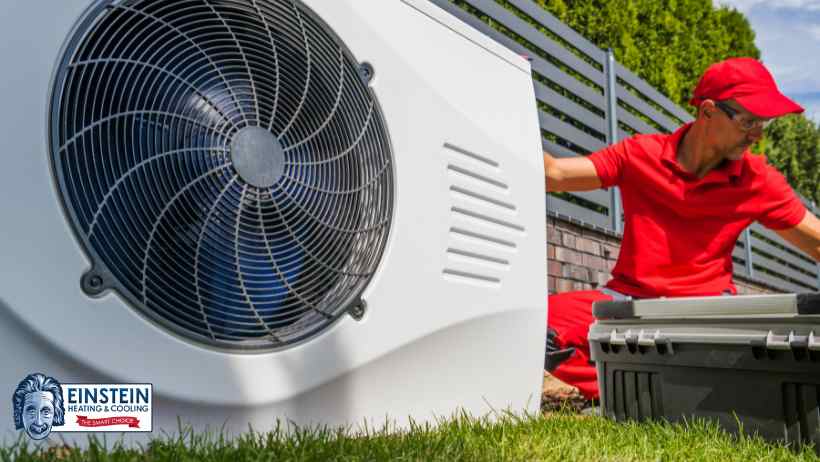
Myths and Facts about heat pumps
We explore and debunk the myths and misconceptions that can cloud the decision-making process for potential heat pump buyers:
Myth 1: Heat Pumps Only Provide Heat
Fact: Heat Pumps Offer Both Heating and Cooling
Myth Debunked: One common misconception is that heat pumps only provide heating. Some homeowners might believe that they are solely useful during the winter months.
The Fact: In reality, heat pumps are designed to both heat and cool your home efficiently. They function as a versatile, year-round climate control solution. During the winter, they extract heat from the outdoor air and transfer it indoors to heat your home. In the summer, this process reverses, and they act as air conditioners by removing heat from your home and releasing it outside.
Myth 2: Heat Pumps are Ineffective in Cold Climates
Fact: Heat Pumps Are Effective in Cold Weather
Myth Debunked: It’s a common belief that heat pumps struggle in extreme cold temperatures. Homeowners in colder regions might be concerned that they won’t work when needed the most.
The Fact: While this might have been true for older models, modern heat pumps are designed to operate efficiently in freezing temperatures. They can extract heat from the outdoor air even in sub-zero conditions. Some advanced models incorporate auxiliary heating elements to ensure warmth in the coldest of weather, making them suitable for all climates.
Myth 3: Heat Pumps Are Too Expensive to Install
Fact: Heat Pump Installation Can Be Cost-Effective
Myth Debunked: Some homeowners assume that installing a heat pump is cost-prohibitive. They may worry about the initial investment required.
The Fact: The cost of installation can vary based on factors such as the type of heat pump, your existing HVAC system, and the size of your home. However, it’s essential to consider the long-term energy savings. Heat pumps are highly energy-efficient, reducing your energy bills over time. Additionally, many regions offer rebates and incentives for installing energy-efficient systems, which can offset the initial installation costs and make heat pumps a cost-effective choice.
Myth 4: Heat Pumps Are Noisy
Fact: Heat Pumps Operate Quietly
Myth Debunked: Some people believe that heat pumps are noisy and disruptive, making them unsuitable for quiet home environments.
The Fact: Older heat pumps may have been noisy, but modern units are designed to operate quietly. Noise levels are comparable to traditional HVAC systems. In fact, some models are exceptionally quiet, making them ideal for residential use. You can enjoy the comfort of your home without the distraction of a loud HVAC system.
Myth 5: Heat Pumps Are Not Energy Efficient
Fact: Heat Pumps Are Highly Energy Efficient
Myth Debunked: One of the common misconceptions about heat pumps is that they are not energy-efficient and won’t lead to significant energy savings.
The Fact: One of the key advantages of heat pumps is their energy efficiency. They can be significantly more energy-efficient than traditional heating and cooling systems. Heat pumps work by transferring heat rather than generating it through combustion, which reduces energy consumption and lowers your energy bills. This makes them an excellent choice for environmentally conscious homeowners.
Myth 6: Heat Pumps Require Frequent Maintenance
Fact: Heat Pumps Are Low-Maintenance
Myth Debunked: Some people believe that heat pumps require constant maintenance and are more demanding in terms of care compared to traditional HVAC systems.
The Fact: Heat pumps are relatively low-maintenance devices. Regular filter cleaning and occasional professional check-ups are usually sufficient to keep them running smoothly. They typically require less maintenance compared to conventional heating systems, which can require regular cleaning and maintenance of combustion components.
Myth 7: Heat Pumps Can’t Replace Traditional Furnaces
Fact: Heat Pumps Can Be a Complete Heating Solution
Myth Debunked: There’s a misconception that heat pumps can’t entirely replace traditional furnaces, especially in extremely cold climates.
The Fact: Heat pumps are capable of providing all the heating and cooling your home needs in most situations. While there may be extreme conditions where a backup heating system is necessary, modern heat pumps can efficiently handle the majority of heating requirements. They are a versatile and reliable heating solution for many homeowners.
Myth 8: Heat Pumps Are Not Environmentally Friendly
Fact: Heat Pumps Are Eco-Friendly
Myth Debunked: Some may believe that heat pumps are not environmentally friendly and still contribute to carbon emissions.
The Fact: Heat pumps are considered environmentally friendly because they transfer heat rather than generating it through combustion. This means they produce lower carbon emissions and help reduce your home’s environmental impact. By choosing a heat pump, you’re making a greener choice for your home’s heating and cooling needs.
Myth 9: Heat Pumps Have Limited Lifespans
Fact: Heat Pumps Have Long Lifespans
Myth Debunked: It’s a common misconception that heat pumps have relatively short lifespans and may require frequent replacement.
The Fact: When properly maintained, heat pumps can have a long lifespan, often exceeding 15 years. Their durability and reliability make them a worthwhile investment. Regular maintenance and prompt repairs when needed can extend their operational life, making them a cost-effective choice in the long run.
Myth 10: Heat Pumps Don’t Provide Consistent Comfort
Fact: Heat Pumps Offer Consistent Comfort
Myth Debunked: Some homeowners may worry that heat pumps can’t provide consistent indoor comfort and temperature control.
The Fact: Heat pumps are designed to maintain a consistent indoor temperature, providing comfort throughout the year. They offer precise temperature control and can adapt to changing conditions quickly. With advanced thermostats and zoning options, you can tailor your heat pump system to meet your specific comfort needs.
Questions to ask your technician before installing a heat pump
The efficiency and effectiveness of your heat pump depend not only on the quality of the equipment but also on the skills and knowledge of the installer. Einstein Heating and Cooling ensures reliability, quality, and top customer satisfaction, as seen in our most recent review of a heat pump service. To make sure you’re making the right choice, here are some questions to ask your installer:
Qualifications and Credentials
- What qualifications and certifications do you possess for heat pump service?
- Are you licensed and insured to work on heat pump systems in this area?
- Can you provide references from previous heat pump installations you’ve completed?
Heat Pump Sizing and Selection
- How do you determine the appropriate size and type of heat pump for my home?
- What factors influence the choice of heat pump model, including energy efficiency and climate considerations?
- Do you perform a load calculation to ensure the heat pump is appropriately sized for my home?
Installation Process
- What is your heat pump service for installing a heat pump, from site assessment to completion?
- Do you offer a written estimate and timeline for the installation?
- Will you obtain any necessary permits or approvals for the installation?
Brand and Equipment
- What heat pump brands or manufacturers do you work with, and why?
- Can I choose a specific heat pump brand, or do you recommend one based on your experience?
- What warranty options are available for the equipment, and what does your installation warranty cover?
Energy Efficiency and Savings
- How can I maximize energy efficiency with my heat pump system?
- Do you offer recommendations for additional energy-saving measures, like insulation or duct sealing?
- What can I expect in terms of energy cost savings after the heat pump service?
Installation Costs
- What is the total cost of the heat pump service starting with the installation, including equipment, labor, and any additional expenses?
- Are there any potential cost-saving incentives, rebates, or financing options available for heat pump service?
- Do you provide a detailed breakdown of the installation costs in the estimate?
Maintenance and Service
- What routine maintenance is required for a heat pump, and can you provide a maintenance schedule?
- Do you offer service and maintenance plans to keep the system running efficiently?
- How quickly can you respond to service calls or emergencies?
Environmental Impact
- How environmentally friendly is the heat pump system you recommend?
- Can you explain the environmental benefits and potential carbon footprint reduction of a heat pump?
Noise and Aesthetics
- Are there options for quieter heat pump models or noise-reducing features?
- How will the heat pump be positioned and installed to minimize its impact on the aesthetics of my home?
Long-Term Performance
- What is the expected lifespan of the heat pump, and how often will it need replacement or major repairs?
- Are there any specific maintenance tasks I can perform to extend the life of the heat pump?
Compliance with Local Regulations
- Are there any local regulations or codes that need to be followed during the installation process?
- Will you handle all necessary inspections and paperwork to ensure compliance?
Backup Heating System
- Do I need a backup heating system, and if so, what options are available?
- How does the heat pump integrate with the existing heating system in my home?
Asking these questions will help you make an informed decision when choosing an installer for your heat pump system. It’s crucial to work with a qualified and experienced professional to ensure your heat pump installation is efficient, cost-effective, and environmentally friendly.
In Conclusion
Heat pump service in Bend, Oregon is a multifaceted task that requires consideration of various factors. Einstein Heating and Cooling is your trusted partner for reliable and efficient heat pump service in Bend, Oregon. With experienced technicians, a commitment to energy efficiency, and a wide range of services, we ensure your heat pump system operates at its best. Don’t wait for heating and cooling issues to escalate. Schedule a service with Einstein Heating and Cooling today and experience year-round comfort in your Bend, Oregon home.
